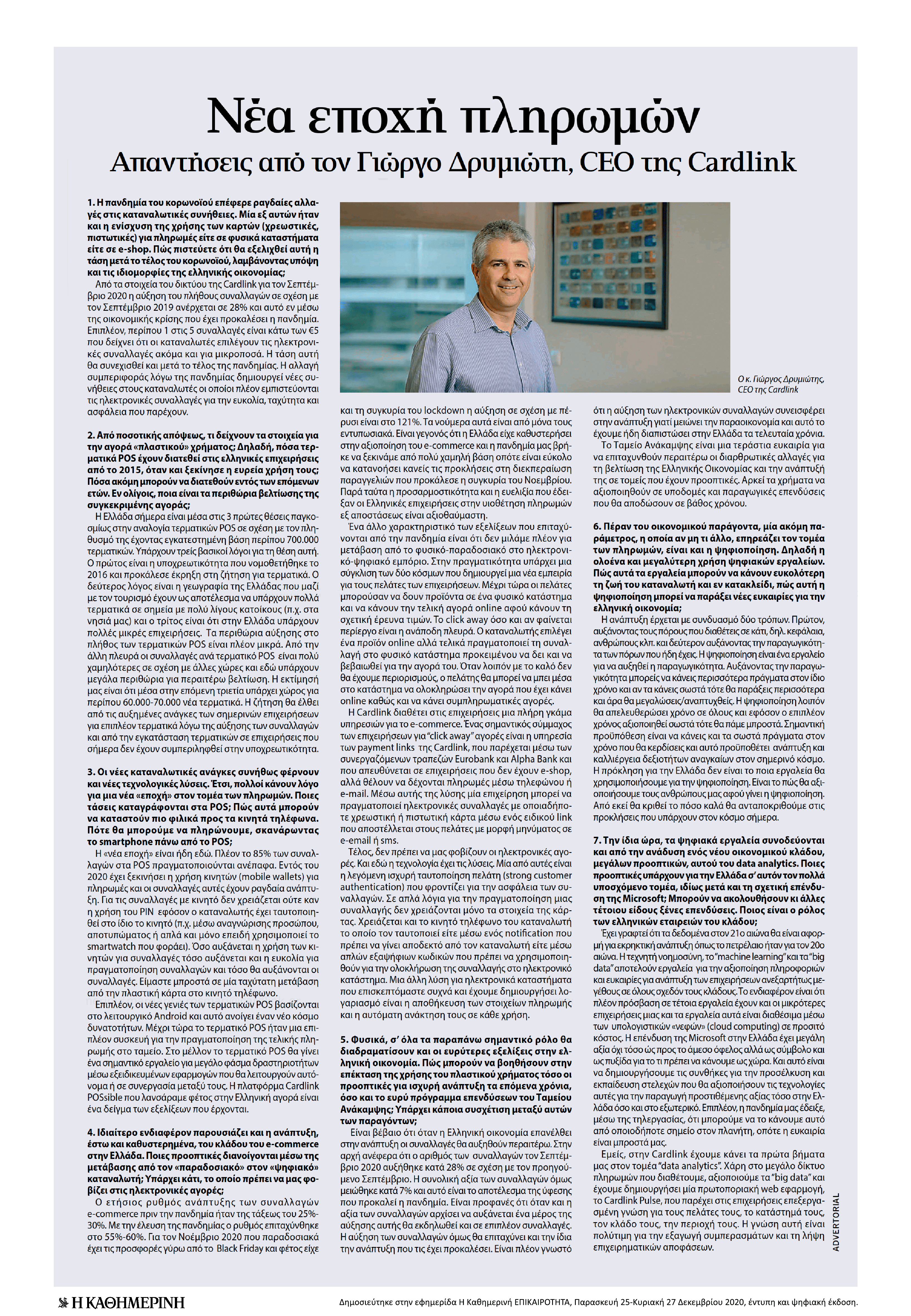Interview of Cardlink’s CEO, George Drymiotis, in the newspaper I Kathimerini
2020 is the milestone year for the new payment era. Significant changes in consumer habits have accelerated the adoption of new technological solutions by businesses. Cardlink’s CEO, George Drymiotis, gives an in-depth interview to Kathimerini newspaper for Fintech, analyzing the trends and prospects of this “new era”.
Published in the newspaper I Kathimerini, EPIKARIOTITA, Friday 25-Sunday 27 December 2020, print and digital edition.
– The coronavirus pandemic has brought about rapid changes in consumer habits. One of them was the boost of the use of cards (debit, credit) for payments, either in physical stores or in e-shops. How do you think this trend will develop after the end of the coronavirus, considering the peculiarities of the Greek economy?
According to the data of Cardlink’s network, for September 2020, the increase in the number of transactions compared to September 2019 amounts to 28%, amid the economic crisis caused by the pandemic.
In addition, about 1 in 5 transactions is under €5 which shows that consumers choose electronic transactions even for small amounts. This trend will continue after the end of the pandemic. Behavior change due to the pandemic creates new habits in consumers who now trust electronic transactions for the convenience, speed and security they provide.
– From a quantitative point of view, what do the data for the “plastic” money market show? That is, how many POS terminals have been disposed to Greek businesses since 2015, when their widespread use began? How many more can be sold in the coming years. In short, what are the margins for improvement in this market?
Greece today is among the top 3 in the world regarding the proportion of POS terminals compared to its population, having an established base of approximately 700,000 terminals. There are three main reasons for this position.
The first is the fact that it became obligatory, with 2016 legislation, causing an explosion in demand for terminals. The second reason is the geography of Greece which together with tourism result in many terminals in places with very few inhabitants (e.g., in our islands) and the third is that in Greece there are many small businesses. The growth margins in the number of POS terminals are now small. On the other hand, transactions per POS terminal are much lower than in other countries, and there is a lot of room for improvement. We estimate that within the next three years about 60,000-70,000 new terminals could be distributed in the market. The demand will come from the increased needs of today’s businesses for additional terminals due to the increase in transactions and from the installation of terminals in businesses that are not currently included in the obligated ones.
– New consumer needs usually bring new technological solutions. So many are talking about a new “era” in the field of payments. What trends are recorded in POS? How can these be made more mobile friendly? When will we be able to pay by scanning the smartphone over the POS?
The “new era” is already here. Now, 85% of POS transactions are made contactless. Within 2020, the use of mobile wallets for payments has started and these transactions are growing rapidly. For mobile transactions, you do not even need to use the PIN if the consumer has been identified on the mobile phone (e.g., through face recognition, fingerprint, or simply by using the smartwatch he is wearing). As the use of mobile phones for transactions increases, so does the ease of making transactions, and so will the transactions. We are in front of a rapid transition from the plastic card to the mobile phone.
Also, the new generations of POS terminals are based on the Android operating system and this opens up a new world of possibilities. Until now, the POS terminal was an additional device for making the payment at the checkout. In the future, the POS terminal will become an important tool for a wide range of activities through specialized applications that will operate independently or in collaboration with each other. The Cardlink POSsible platform that we launched this year in the Greek market is a sample of the upcoming developments.
– Even though belatedly, the development of the e-commerce sector in Greece shows particular interest. What perspectives open up through the transition from the “traditional” to the “digital” consumer? Is there anything that should scare us in e-shopping?
The annual growth rate of e-commerce before the pandemic was around 25%-30%. With the coming of the pandemic, the rate accelerated to 55%-60%. For November 2020, which traditionally includes the Black Friday offers, however, this year also included the lockdown, the increase compared to last year is 121%. These numbers are truly impressive. It is a fact that Greece was late in utilizing e-commerce, and the pandemic found us starting from a very low point, meaning that there were great challenges in processing orders caused by the November situation. Nevertheless, the adaptability and flexibility shown by the Greek business in adopting distance payments are admirable.
Another feature of the developments accelerated by the pandemic is that we no longer talk about a transition from natural-traditional to e-digital commerce. In fact, there is a convergence of the two worlds that creates a new experience for customers. Until now, customers could see products in a physical store and make the purchase online, after the relevant price research. Click-away, as strange as it may seem, is the reverse side. The consumer chooses a product online but ultimately pays in the physical store in order to be able to see and be sure of the purchase. So, when we have no restrictions, the customer will be able to enter the store to complete the purchase he has made online as well as to make additional purchases.
Cardlink offers businesses a full range of e-commerce services. An important business ally for “click-away” purchases, is Cardlink’s Payment links service, provided through partner banks Eurobank and Alpha Bank, for businesses that do not have an e-shop but want to accept payments by phone or e-mail. Through this solution, a business can make electronic transactions with any debit or credit card through a special link that is sent to customers in the form of an email or SMS.
Furthermore, we should not be intimidated by online shopping. And here technology has solutions. One of them is the so-called strong customer authentication, which ensures the security of transactions. Simply put, you do not only need the card details to make a transaction. You also need the consumer’s mobile phone which identifies him either through a notification that must be accepted by the consumer or through simple six-digit codes that must be used to complete the transaction in the online store. Another solution for online stores that we visit often and have created an account is to save the payment details and automatically retrieve them each time.
– Of course, the broader developments in the Greek economy will also play an important role in all the above. How can both the prospects for strong growth in the coming years and the broad investment program of the Recovery Fund help to expand the use of plastic money? Is there a correlation between these factors?
It is certain that when the Greek economy returns to growth, the trade will increase further. I mentioned at the beginning that the number of transactions in September 2020 increased by 28% compared to the previous September. However, the total value of transactions decreased by 7%, and this is the result of the recession caused by the pandemic. It is obvious that when the value of transactions begins to increase, a part of this increase will be manifested in additional transactions.
However, the increase in transactions will accelerate the growth that has caused them. It is now known that the increase of electronic transactions contributes to growth because it reduces the informal economy and is something that we have already seen in Greece in recent years.
The Recovery Fund is a huge opportunity to further accelerate the structural changes for the improvement of the Greek economy, and its growth in sectors that have prospects. As long as the money is used in infrastructure and productive investments, that will pay off in the long run.
– Apart from the economic factor, another parameter, which if nothing else, affects the payments sector, is digitization. That is, the increasing use of digital tools. How can these tools make the life of the consumer easier and in conclusion, how can this digitization produce new opportunities for the Greek economy?
Growth comes in a dual combination. Firstly, by increasing the resources you have on something, i.e., funds, people, etc., and secondly, by increasing the productivity of the resources you already have. Digitization is a tool to increase productivity. By increasing productivity, you can do more things at the same time and if you do them right, then you will produce more, and therefore you will grow/develop. So, digitization will free up time for everyone, and if the extra time is used properly, then we will move forward. An important condition is to do the right things in the time you will earn, and this presupposes the development and cultivation of skills necessary in today’s world.
The challenge for Greece is not what tools we will use for digitization. It is how we will utilize our people after digitization.
That’s the point that will define how well we will respond to the challenges that exist in the world today.
– At the same time, digital tools are accompanied by the emergence of a new, high-perspective, financial industry, which is data analytics. What are the prospects for Greece in this promising sector, especially after the relevant investment of Microsoft? More foreign investments such as this might follow. What is the role of Greek companies in the industry?
It has been written that the data in the 21st century will be an opportunity for explosive growth, as oil was for the 20th century. Artificial intelligence, “machine learning” and “big data” are tools for utilizing information and opportunities for business development, regardless of size, in almost all sectors. The interesting thing is that even smaller companies now have access to such tools since these tools are available through cloud computing, at affordable costs. Microsoft’s investment in Greece has great value, not so much in terms of immediate benefit but as a symbol and as a compass for what we should do as a country. And this is to create the conditions for the attraction and training of executives who will utilize these technologies to produce added value both in Greece and abroad. In addition, the pandemic has shown us, through teleworking, that we can do this from anywhere on the planet, so the opportunity is ahead of us.
We, at Cardlink, have taken the first steps in the field of “data analytics”. Thanks to the large payment network we have, we utilize the “big data” and we have created a pioneering web application, Cardlink pulse, which provides businesses with processed knowledge about their customers, their store, their industry, their region. This knowledge is valuable for drawing conclusions and making business decisions.



